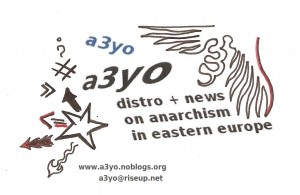MOSCOW — Two young people identified as ultranationalists will face charges in the January shooting that killed a crusading lawyer and a reporter, an attack that cast a pall over Russia’s dwindling circle of human rights activists.

Prosecutors on Thursday announced the arrest of Nikita Tikhonov and
Yevgenia Khasis, both in their 20s, who appeared in court with black
hoods over their heads. The chief of Russia’s Federal Security Service,
Aleksandr Bortnikov, said that the suspects were identified during a
crackdown on extremist groups in Moscow, and that the killer had
confessed.


The attack on the lawyer, Stanislav Markelov, and the
reporter, Anastasia Baburova, was brazen even by Moscow standards. As
the two victims left a daytime news conference a few blocks from the
Kremlin, a masked man ran up behind them and shot Mr. Markelov, 34, in
the head at point-blank range. He then fatally shot Ms. Baburova, a
25-year-old reporter trainee who had been interviewing Mr. Markelov,
and escaped into a crowded subway station.
After a briefing on the arrests, Russia’s president, Dmitri A. Medvedev,
said ultranationalist attacks “are not simply grave crimes, but crimes
which have great resonance in society.” He said he was pleased that the
case had been solved in such a short time — around 10 months after the
shootings — and hoped that “such reports will come regularly.”
The
mood among Mr. Markelov’s friends was less triumphant. A growing list
of journalists and political activists have been killed in recent
years, but few of those cases have ended in prosecution. Those that
have, notably the shootings of the journalists Anna Politkovskaya and Paul Klebnikov, have identified only low-level criminals or have fallen apart in the courtroom.
“Until the case is closed, it’s not closed,” said Aleksandr Cherkasov of the rights organization Memorial,
who was a close friend of Mr. Markelov’s. “Will it be a jury trial?
Will the prosecutors be able to prove their case? How much opportunity
will there be to manipulate the jury, or influence the jury? So this is
not finished.”
“I have no feeling of relief,” he added, “because none of this will resurrect a person.”
At the court appearance, lawyers for the suspects refused to comment on the charges.
“He does have his position, but prefers not to tell it,” said Yevgeny Skripilyov, who is representing Mr. Tikhonov.
A
man named Nikita Tikhonov was one of several neo-Nazis charged with
murdering Aleksandr Ryukhin, 19, an antifascist campaigner, in a 2006
case that Mr. Markelov handled, although it is not clear whether that
Mr. Tikhonov is the same one arrested in the killings of Mr. Markelov
and Ms. Baburova. The authorities said Mr. Tikhonov was never arrested
in the Ryukhin case because they could not locate him, yet several of
his friends received prison sentences as accessories to the crime.
“It
was largely due to Markelov that these people received serious
sentences,” said Galina V. Kozhevnikova, a deputy director at the Sova
Center, which tracks Russian nationalist groups. “In this sense,
Tikhonov certainly had a motive.”
He was believed to be a member
of a group called the Unified Brigade-88, with the number meant to
signify “Heil Hitler,” Ms. Kozhevnikova said. Russian newspapers linked
the group to an attack on a Moscow market in 2001, in which a mob of
young men beat traders with metal rods, killing three and wounding
dozens.
Aleksandr Belov, the former leader of the nationalist Movement Against Illegal Immigration,
said he got to know the suspect during a parliamentary campaign, when
Mr. Tikhonov, 29, worked as a speechwriter. After their candidate lost
the race, Mr. Tikhonov went on to work as a journalist and then at a
marketing and consulting firm, Mr. Belov said, adding that he doubted
that his acquaintance was behind the murder.
“He was certainly
a nationalist,” Mr. Belov said. “I am doubtful, though, because
frequently these days, and especially on holidays, Russian special
forces detain people who are not guilty of anything in order to show
their effectiveness.” Mr. Tikhonov was taken into custody on National Unity Day, the Nov. 4 holiday that has become a rallying point for extreme nationalist and neo-Nazi groups.
Less
is known about the second suspect, Ms. Khasis, who is 25. A supervisor
at Bukh Uchyot Torgovlya, an Internet technology supply company, said
Ms. Khasis worked there as a manager and expressed shock at the
charges.
Mr. Bortnikov, the head of the Federal Security
Service, told Mr. Medvedev at a meeting that his investigators had
cracked the case while scrutinizing Moscow’s extremist groups, and then
zeroed in on a suspect, who confessed to the crime. During the process,
he said, investigators seized a large cache of weapons from the group
and discovered that its members were responsible for the September
murder of a non-Russian, based on race. A third “high profile” murder
was in the planning stage, he said.
Nationalist groups exploded
in Russia after the collapse of the Soviet Union, and they still exert
a powerful hold on disappointed and disaffected young men and women.
About 2,000 nationalist sympathizers gathered Wednesday in a
neighborhood that is home to many migrant laborers, waving swastikas
and chanting “Russia for Russians.”
Around 60 migrant workers have been killed in nationalist attacks this year, the Moscow Bureau for Human Rights reported this week.
Mr. Markelov clashed with nationalists on a variety of cases, including his last: a parole hearing for Yuri D. Budanov,
a former Russian tank commander who became revered by nationalists
after he was convicted of murdering a young Chechen woman. Mr. Markelov
had vowed to block the parole, and a news conference on this subject
had just ended when he and Ms. Baburova stepped out onto the sidewalk
and were killed.
source: http://www.nytimes.com/2009/11/06/world/europe/06russia.html



